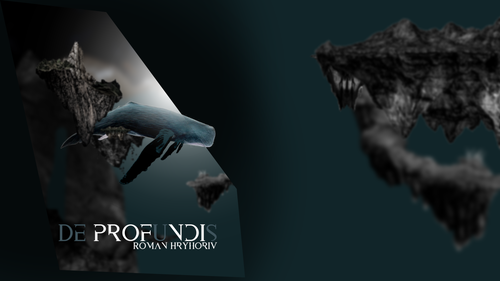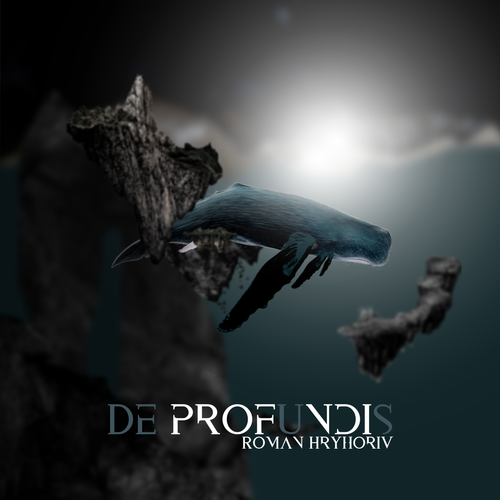Ukrainian Live Classic presents music for every taste so that both fans of the classics and connoisseurs of the avant-garde can equally discover and enjoy the treasures of Ukrainian music. There is undoubtedly music to satisfy the preferences of all listeners without exception. To such, we can boldly include our first release of the music by contemporary composer Roman Hryhoriv - the oratorio "De Profundis" for mixed choir, soloists, and symphony orchestra (2010). Here is a live recording from a concert at the "Music Premieres of the Season" festival in 2012.
The diploma work of a graduate from the National Academy of Music impresses listeners with its depth, scope, and professionalism. The oratorio consists of three parts. The first - Cadenza - is an orchestral prologue. Its title is symbolic and refers to the cycles of life: after the end, there will be a new beginning; to rise, you must first fall. In the central and largest part - De Profundis - the main musical material is presented with the participation of the choir and soloists. The oratorio is based on the text of David`s Psalm 129 (130). This is a desperate plea for forgiveness of sins, a prayer for mercy and protection of the people. The Psalm reads as follows:
1. From the depths I cry to You, O Lord:
2. Lord, hear my voice! May Your ears hear the voice of my supplication!
3. If You, O LORD, kept track of iniquities, then who, O Lord, could stand?
4. For in You is forgiveness, to fear You...
5. I trust in the Lord, my soul has hope, and I trust in His word.
6. My soul looks to the Lord more than the watchman in the morning, that it watches until the morning.
7. Let Israel hope in the Lord, for with the Lord is mercy, and great deliverance is with Him,
8. And He will deliver Israel from all its sins!
The last episode - Postlude - afterword, Epilogue, where we can hear soprano, viola and choir accompanied by an orchestra, reminiscent of an angel's song. This is music enveloped in light - a symbol of obedience and inner peace. At the same time, it is a joy that comes only after a soul-sapping struggle.
Probably written more than 3 thousand years ago, the text of "De Profundis" has always inspired artists. In particular, among composers, Josquin Depré and Orlando di Lasso, Johann Sebastian Bach and Antonio Salieri, Felix Mendelssohn, Franz Liszt, and others referred to it. Roman Hryhoriv characterizes his work as tragic and humanistic at the same time. The influence of baroque music is felt in the oratorio, and the Beethovenian concept "from darkness to light" chosen by the composer works in tandem with the idea of a literary source. Powerful music reinforces the essence of the text and creates the maximum psychological and emotional effect that has a convincing effect on the listener.
The oratorio "De Profundis" by Roman Hryhoriv is presented in Ukrainian Scores, our largest database of Ukrainian music.
The diploma work of a graduate from the National Academy of Music impresses listeners with its depth, scope, and professionalism. The oratorio consists of three parts. The first - Cadenza - is an orchestral prologue. Its title is symbolic and refers to the cycles of life: after the end, there will be a new beginning; to rise, you must first fall. In the central and largest part - De Profundis - the main musical material is presented with the participation of the choir and soloists. The oratorio is based on the text of David`s Psalm 129 (130). This is a desperate plea for forgiveness of sins, a prayer for mercy and protection of the people. The Psalm reads as follows:
1. From the depths I cry to You, O Lord:
2. Lord, hear my voice! May Your ears hear the voice of my supplication!
3. If You, O LORD, kept track of iniquities, then who, O Lord, could stand?
4. For in You is forgiveness, to fear You...
5. I trust in the Lord, my soul has hope, and I trust in His word.
6. My soul looks to the Lord more than the watchman in the morning, that it watches until the morning.
7. Let Israel hope in the Lord, for with the Lord is mercy, and great deliverance is with Him,
8. And He will deliver Israel from all its sins!
The last episode - Postlude - afterword, Epilogue, where we can hear soprano, viola and choir accompanied by an orchestra, reminiscent of an angel's song. This is music enveloped in light - a symbol of obedience and inner peace. At the same time, it is a joy that comes only after a soul-sapping struggle.
Probably written more than 3 thousand years ago, the text of "De Profundis" has always inspired artists. In particular, among composers, Josquin Depré and Orlando di Lasso, Johann Sebastian Bach and Antonio Salieri, Felix Mendelssohn, Franz Liszt, and others referred to it. Roman Hryhoriv characterizes his work as tragic and humanistic at the same time. The influence of baroque music is felt in the oratorio, and the Beethovenian concept "from darkness to light" chosen by the composer works in tandem with the idea of a literary source. Powerful music reinforces the essence of the text and creates the maximum psychological and emotional effect that has a convincing effect on the listener.
The oratorio "De Profundis" by Roman Hryhoriv is presented in Ukrainian Scores, our largest database of Ukrainian music.
Text: Victoriia Antoshevska
Translated into English by Taras Demko
Translated into English by Taras Demko
Listen to music
Слухати музику
Performed by:
Performed by: Kyiv Symphony Orchestra, the choir of the Kyiv Municipal Academic Theater of Opera and Ballet for Children and Youth (choirmaster Anzhela Maslenikova).
Soloists: Iryna Kichleruk – soprano, Olha Romanenko – mezzo-soprano, Valentyn Dytyuk – tenor, Andriy Koshman – baritone. Conductor Serhiy Svintsytskyi.
“De Profundis”
Роман Григорів
Кожен альбом додатку Ukrainian Live Classic презентує твори на будь-який смак, щоб і прихильники класики, і поціновувачі авангарду та нестандартних звукових рішень могли однаковою мірою відкривати для себе справжній клондайк української музики. Але трапляються серед наших релізів такі “бестселери”, які, в хорошому розумінні, задовольняють вподобання всіх без винятку слухачів. До їх числа сміливо зараховуємо перший в рамках проєкту реліз сучасного композитора Романа Григоріва – ораторію “De profundis” для мішаного хору, солістів і симфонічного оркестру (2010). До вашої уваги запис наживо з концерту в рамках фестивалю «Музичні Прем’єри Сезону» у 2012 році.
Дипломна робота випускника Національної музичної академії вражає глибиною, масштабом та професійністю втілення задуму. Ораторія складається з трьох частин. Перша – Cadenza – є оркестровим прологом. Її назва – це символ циклічності: після завершення буде початок; щоб піднятися, треба спочатку впасти. У центральній та найбільшій частині – De profundis – за участі хору і солістів викладений основний музичний матеріал. Ораторія написана на текст Давидового Псалма 129 (130). Це відчайдушне благання про прощення гріхів, молитва про милість і опіку над своїм народом. У відомому перекладі Івана Огієнка текст Псалма звучить так:
1. З глибини я взиваю до Тебе, о Господи:
2. Господи, почуй же мій голос! Нехай уші Твої будуть чулі на голос благання мого!
3. Якщо, Господи, будеш зважати на беззаконня, хто встоїть, Владико?
4. Бо в Тебе пробачення, щоб боятись Тебе…
5. Я надіюсь на Господа, має надію душа моя, і на слово Його я вповаю.
6. Виглядає душа моя Господа більш, ніж поранку сторожа, що до ранку вона стереже.
7. Хай надію складає Ізраїль на Господа, бо з Господом милість, і велике визволення з Ним,
8. і Ізраїля визволить Він від усіх його прогріхів!
Останній епізод – Postlude – післямова, епілог за участі cопрано, альта і хору у супроводі оркестру, що нагадує ангельську пісню. Це оповита світлом музика – символ покори і внутрішнього миру. У той же час, це радість, що настає лише після боротьби, яка виснажує душу.
Написаний вірогідно понад 3 тисячі років тому текст “De profundis” завжди надихав митців. Зокрема, серед композиторів, до нього зверталися Жоскен Депре і Орландо ді Лассо, Йоганн Себастьян Бах і Антоніо Сальєрі, Фелікс Мендельсон, Ференц Ліст та інші. Роман Григорів характеризує свій твір як трагічний і водночас гуманістичний. В ораторії відчувається вплив музики бароко, а обрана композитором бетховенська концепція “від темряви до світла” виступає в тандемі з ідеєю літературного джерела. Потужна музика підсилює суть тексту і створює максимальний психологічно-емоційний ефект, що переконливо діє на слухача.
Ораторія “De Profundis” Романа Григоріва представлена у нашій найбільшій нотній базі з українською музикою Ukrainian Scores. Всього декілька кліків – і ваша домашня бібліотека стане багатшою на один приголомшливий твір.
Дипломна робота випускника Національної музичної академії вражає глибиною, масштабом та професійністю втілення задуму. Ораторія складається з трьох частин. Перша – Cadenza – є оркестровим прологом. Її назва – це символ циклічності: після завершення буде початок; щоб піднятися, треба спочатку впасти. У центральній та найбільшій частині – De profundis – за участі хору і солістів викладений основний музичний матеріал. Ораторія написана на текст Давидового Псалма 129 (130). Це відчайдушне благання про прощення гріхів, молитва про милість і опіку над своїм народом. У відомому перекладі Івана Огієнка текст Псалма звучить так:
1. З глибини я взиваю до Тебе, о Господи:
2. Господи, почуй же мій голос! Нехай уші Твої будуть чулі на голос благання мого!
3. Якщо, Господи, будеш зважати на беззаконня, хто встоїть, Владико?
4. Бо в Тебе пробачення, щоб боятись Тебе…
5. Я надіюсь на Господа, має надію душа моя, і на слово Його я вповаю.
6. Виглядає душа моя Господа більш, ніж поранку сторожа, що до ранку вона стереже.
7. Хай надію складає Ізраїль на Господа, бо з Господом милість, і велике визволення з Ним,
8. і Ізраїля визволить Він від усіх його прогріхів!
Останній епізод – Postlude – післямова, епілог за участі cопрано, альта і хору у супроводі оркестру, що нагадує ангельську пісню. Це оповита світлом музика – символ покори і внутрішнього миру. У той же час, це радість, що настає лише після боротьби, яка виснажує душу.
Написаний вірогідно понад 3 тисячі років тому текст “De profundis” завжди надихав митців. Зокрема, серед композиторів, до нього зверталися Жоскен Депре і Орландо ді Лассо, Йоганн Себастьян Бах і Антоніо Сальєрі, Фелікс Мендельсон, Ференц Ліст та інші. Роман Григорів характеризує свій твір як трагічний і водночас гуманістичний. В ораторії відчувається вплив музики бароко, а обрана композитором бетховенська концепція “від темряви до світла” виступає в тандемі з ідеєю літературного джерела. Потужна музика підсилює суть тексту і створює максимальний психологічно-емоційний ефект, що переконливо діє на слухача.
Ораторія “De Profundis” Романа Григоріва представлена у нашій найбільшій нотній базі з українською музикою Ukrainian Scores. Всього декілька кліків – і ваша домашня бібліотека стане багатшою на один приголомшливий твір.
Виконавці: Державний естрадно-симфонічний оркестр, хор Київського муніципального академічного театру опери і балету для дітей та юнацтва (хормейстер Анжела Масленікова). Солісти: Ірина Кишлярук – сопрано, Ольга Романенко – меццо-сопрано, Валентин Дитюк – тенор, Андрій Кошман – баритон. Диригент Сергій Свінцицький.
.
Текст: Вікторія Антошевська
.
Текст: Вікторія Антошевська


